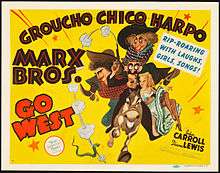
Go West (Go West album)
Go West is the debut album by the English pop duo Go West, released in 1985. The album brought Go West into the limelight, scoring them a string of top 40 hits in the UK and New Zealand. "We Close Our Eyes" was the most successful single, reaching #4 in New Zealand and #5 in the UK.
Album history
Go West had been writing songs for the album since 1982, when they were formed in London by Peter Cox and Richard Drummie. Two songs featured on the album, "We Close Our Eyes" and "Call Me", helped Go West land a record deal with Chrysalis Records.
The album featured more Top 40 UK/New Zealand hits than any of their other albums and helped them to be voted Best Newcomers at the 1986 Brit Awards.
The song "Goodbye Girl" was featured in the first episode of the second season of the 1980s TV series Miami Vice.
Track listing
All songs written by Peter Cox and Richard Drummie.
Side one
Go West
Go West may refer to:
Companies
Film, art and entertainment
Music
- Go West (Go West album), the band's first album in 1985
Songs

Go West (1940 film)
Go West (a.k.a. The Marx Brothers Go West) is the tenth Marx Brothers comedy film, in which brothers Groucho, Chico, and Harpo head to the American West and attempt to unite a couple by ensuring that a stolen property deed is retrieved. It was directed by Edward Buzzell and written by Irving Brecher, who receives the original screenplay credit.
Plot
Confidence man S. Quentin Quale (Groucho) heads west to find his fortune. In the train station, he encounters crafty brothers Joseph (Chico) and Rusty Panello (Harpo) who manage to swindle his money. The Panello's are friends with an old miner named Dan Wilson (Tully Marshall) whose property, Dead Man's Gulch, has no gold. They loan him their last ten dollars for a grub stake and he gives them the deed to the Gulch as collateral. Unbeknownst to Wilson, the son of his longtime rival and beau to his granddaughter Eve Wilson (Diana Lewis), Terry Turner (John Carroll) has contacted the railway to arrange for them to build through the land, making the deed holder rich.

Go West (exhibition)
Go West is the title of the first exhibition by Stuckist artists in a commercial London West End gallery. It was staged in Spectrum London gallery in October 2006. The show attracted media interest for its location, for the use of a painting satirising Sir Nicholas Serota, Director of the Tate gallery, and for two paintings of a stripper by Charles Thomson based on his former wife, artist Stella Vine.
Show
The Stuckists had previously been seen as art world outsiders, but with the backing of a West End gallery in a "major exhibition" became "major players" in the art world. Ten leading Stuckist artists were exhibited.
Royden Prior, the director of Spectrum London, said, "These artists are good and are part of history. Get past the art politics and look at the work."
Art critic Edward Lucie-Smith wrote in an essay for the show:
Rachel Campbell-Johnston, art critic of The Times, condemned the work as "empty of anything much" and "formulaic". Nevertheless, Thomson's and Joe Machine's paintings sold out, before the show opened, to buyers from the UK, Japan and the US.
Podcasts:

